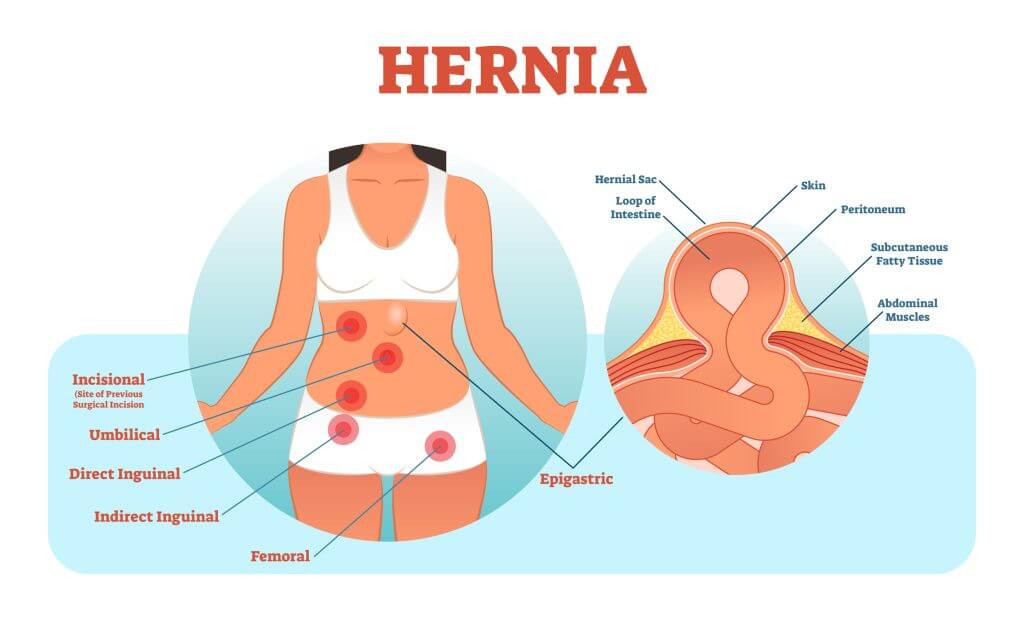How to Tell If You Have a Pulled Abdominal Muscle or Hernia

Abdominal strains and hernias are painful conditions that worsen with activity and lessen with rest. However, they have different causes and unique sets of symptoms. If you believe you’re suffering from one or the other, discovering which it is will determine how you treat the condition.
And even before you have any symptoms, you should consider whether you are headed for a hernia.
Do You Have a Hernia or Strained Abdominal Muscle?
People experiencing pain or discomfort in their abdomens understandably want to determine what’s causing it. How do you know if stomach pain is muscular or caused by a hernia? It helps to learn a little about the two conditions.
What is an abdominal strain?
An abdominal muscle strain is the stretching, tearing, or rupturing of abdominal muscles. The condition is also commonly referred to as a pulled abdominal muscle.
What is a hernia?
A hernia is a condition where an internal organ or body part protrudes through the wall of tissue or muscle that contains it.

Common types of hernias include:
- Inguinal hernia
- Femoral hernia
- Umbilical hernia
- Hiatal (hiatus) hernia
- Incisional hernia
- Epigastric hernia
- Spigelian hernia
- Diaphragmatic hernia
How common are hernias? As much as 10% of the population will experience a hernia in their life, and surgeons perform more than a million hernia repair procedures yearly in the U.S. The most common type of hernia is an inguinal hernia. Of all hernias, inguinal or femoral hernias make up between 75-80%, incisional hernias account for 2%, umbilical hernias make up 3-10%, and other types of hernias fill in the other 1-3%.
Causes of Abdominal Strains vs. Hernias
Abdominal strains and hernias have both shared and unique causes.
Abdominal strain causes
Several activities can cause an abdominal strain, including:
- Lifting heavy objects, especially with improper lifting technique
- Sudden twisting of the torso
- Excessive or very intense exercise
- Vigorous coughing, sneezing, or laughing
- Any other activity that engages the abdominal muscles with excessive force
Hernia causes
While a hernia may develop over time as tissues or muscles lose their strength, the same activities that result in an abdominal strain can cause or worsen a hernia. Ultimately, any activity that causes an increase in pressure in the abdomen can cause a hernia, including:
- Lifting heavy objects without first stabilizing the abdominal muscles
- Diarrhea or constipation
- Persistent coughing or sneezing
Abdominal Strain vs. Hernia Symptoms
The symptoms of abdominal strains and hernias are listed below.
What does a strained abdominal muscle feel like?
The surface of your stomach area may feel tender and inflamed if you have a strained abdominal muscle. You may also experience sudden sharp pain when moving or contracting your abdominal muscles.
In general, symptoms of an abdominal strain can include:
- Tenderness and swelling
- Sharp pain
- Weakness in the abdominal muscles
- Bruising
- Muscle spasms
- Stiffness and inability to stretch the muscles
Understanding the causes of and relief for abdominal spasms or strains can help you get past them more easily.
What does a hernia feel like?
Typically, patients experience warning signs of a hernia. For example, they describe mild pain, aching, or a pressure sensation at the hernia site. The discomfort worsens with any activity that strains the abdomen, such as heavy lifting, running, or bearing down during bowel movements.
What are the five warning signs of a hernia? Depending on what body parts are involved, the symptoms of an abdominal hernia can include:
- Pain or discomfort in the affected area
- Bulge or lump in the abdomen
- Burning or aching sensation
- Nausea or vomiting
- Constipation
Treatment for Abdominal Strain vs. Hernia
Although they have some symptoms in common, abdominal strains and hernias have different treatments.
Abdominal strain treatment
How do you heal an abdominal strain? Or can an abdominal strain heal on its own?
You should treat an abdominal strain in generally the same way as other pulled muscles. Typically, healing an abdominal strain is about helping the body do what it does naturally. You should start with rest. You can also initially apply a cold pack to the area to minimize swelling and later apply heat to increase blood flow and speed healing. Over-the-counter pain relievers can be used to reduce discomfort.
Once the symptoms have subsided, you can help prevent a recurrence by performing core-strengthening exercises regularly. You are also less likely to strain an abdominal muscle if you warm up and stretch before exercising, gradually increase the intensity of your exercise program, give your abdominals some rest each week, and maintain good posture.
Hernia treatment
In general, hernias are not immediately life-threatening. However, they do not go away on their own and may require surgery. Failure to address a hernia can lead to serious complications, including bowel obstruction and death of tissue that gets trapped in the hernia sac, losing its blood supply—a condition known as a strangulated or incarcerated hernia.
Abdominal Strain vs. Hernia: Summary of Symptoms, Causes, and Treatments
Both issues can require medical attention if they are severe. Warning signs of a more serious instance can include significant tenderness and swelling, severe pain, inability to pass gas or have a bowel movement, fever, pale skin, cold sweats, dizziness, and fainting.
The tables below summarize abdominal strain and hernia symptoms, causes, and treatments.
| Symptoms | Strain | Hernia |
|---|---|---|
| Bulge in abdomen | X | |
| Pain in abdomen that worsens with movement | X | X |
| Bruising | X | |
| Aching/burning sensation | X | |
| Nausea and vomiting | X | |
| Sudden muscle spasms or cramping | X | |
| Muscle stiffness | X |
| Causes | Strain | Hernia |
|---|---|---|
| Intense exercising | X | |
| Improper lifting of heavy objects | X | X |
| Sudden or fast movements | X | |
| Increase in pressure on the abdomen. | X | |
| Diarrhea or constipation | X | |
| Persistent coughing or sneezing | X | X |
| Recommended Treatment | Strain | Hernia |
|---|---|---|
| Surgery | X | |
| Abdominal binder | X | X |
| Applying ice | X | X |
| Applying heat | X | |
| Over-the-counter drugs | X |
Seek Help from Baptist Health for Hernias or Abdominal Strains
If you’re suffering from abdominal pain, Baptist Health is here to help. Your primary care physician can diagnose and treat abdominal strains and hernias. They can also answer questions like “What causes muscle spasms under the rib cage?” “How do you relieve lower abdominal spasms?” and “How do I check myself for a hernia?”
Find a provider near you today or learn more about the services available at Baptist Health.
Next Steps and Useful Resources
Find a Provider
Does Your Hernia Require Surgery?
Common Types of Hernias
Headed for a Hernia


.jpg?rev=d9d3c9f7de2245849bfad9ddecf97365)
